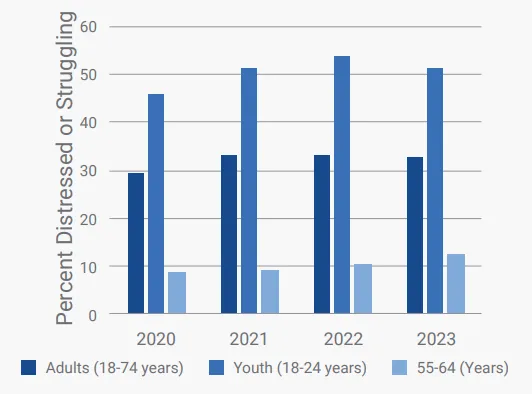Mental well-being on decline post-Covid with Gen Z worst affected: Study
A pan-India study by Sapien Labs reveals that in 2023, 51% of 18-24-year-olds reported being in distress or struggling with mental health.
A report in a series launched by Sapien Labs Centre for Human Brain and Mind at Krea University, on the 'Mental State of India' has examined the state of mental health among primarily English-speaking internet-enabled individuals, with a focus on youth between the ages of 18-24.
The report reveals how the mental health of this group has changed since the pandemic began in 2020. Findings are based on data from 106,427 respondents across 36 states and union territories, obtained between April 2020 and August 2023 as part of the Global Mind Project.
According to a press release, almost two years after the pandemic that reduced social interactions, increased unemployment rates, and increased use of the internet and social media, the mental health scores for Indians across age groups (18-74 years) declined between 2020-2023. The decline is steepest among 18-24-year-olds.
Figure: Percent distressed or struggling - 2020 to 2023

(Source: Global Mind Project, Sapien Labs)
Although the mental health outcomes of the youth are poor, the study does not find evidence that the underlying drivers are economic, as findings are consistent across income levels.
The study also finds much less variation in mental health across states among 18-24-year-olds than older age groups. It says that Tamil Nadu and Kerala perform better than the northern states.
Notwithstanding the current media and policy discourse around the role of academic stress and socio-economic factors such as income and employment, the study underscores the need to look at early risk factors that can inform preventive strategies.
The study points out that the country's 200 million plus youth population may enter the labour market at a gross disadvantage with regard to functioning effectively. The fact that even the more educated, predominantly English-speaking internet-enabled youth are struggling is cause for concern.
Shailender Swaminathan, Director, Sapien Labs Centre for the Human Brain and Mind, India, said, "The current policy paradigm seeks to manage and treat mental health ailments through access to psychosocial support and crisis interventions. Given the sheer scale and complexity of the problem, a more preventative approach may be necessary. As we attempt to "unlock" the potential of youth to spur development, robust data is the need of the hour - to provide early warning signals and inform policy and advocacy efforts.”
The Sapien Labs Centre for the Human Brain and Mind in India is a collaboration between Sapien Labs (USA) and Krea University, with an aim to pursue research and learning related to the human brain and mind.
Edited by Megha Reddy






